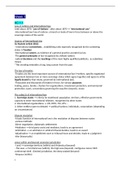Week 1
KC 1.1
Law of nations and International law
Until about 1870: ‘Law of Nations”, after about 1870 → “International Law”
-International law/ law of nations: a branch or body of law in force between or above the
sovereign states of the world
Sources of International law
ICJ Statute Article 38(1):
- International conventions… establishing rules expressly recognized by the contesting
states (=Treaties)
-International custom, as evidence of a general practice accepted as law
-The general principles of law recognized by civilized nations
-Judicial decisions and the teachings of the most highly qualified publicists.. as subsidiary
means
*This wording embodies a long, long custom from the past
The law of treaties
-Treaties are the most important sources of international law (=written, specific negotiated
agreement between two or more sovereign states which agree together and agree to all be
legally bound by that treaty, governed by international law).
-Thousands and thousands of treaties in force, for various purposes:
trading, peace, border, charters for organizations, investment protection, environmental
protection, taxes, conventions governing the seas/the Antarctic, moon
The subjects of international law
1. Sovereign states → criteria for statehood: population, territory, effective government,
capacity to enter international relations, recognition by other states
2. International organizations → UN, WTO, ITU, ATS….
3. Other entities (open to debate) → political factions, individuals, corporations (depending
on circumstances)
Dispute resolution
-A basic function of international law is the resolution of disputes between states
-various methods:
-Direct negotiation, diplomatic settlements
-Mediation → third party assist and mediates, leads to an agreement
-Arbitration → an arbitrator or arbitral tribunal decides, leads to an award
-Adjudication → an established court or tribunal hears and decides, leads to a judgment
-War (historically)
Areas within and beyond sovereign jurisdiction
- Land → sovereign territory (within) and Antarctica (beyond)
- The seas → Territorial sea (within), the high seas (beyond), contiguous zones/ EEZ/
continental shelf.. (limited jurisdiction, the deep seabed (beyond)
-Airspace (within)
1
,-Outer Space –. 80-100 km above (beyond)
Positive law vs. Natural law
-Positive law= man-mad, written law in formal procedure
Strength: formal legitimacy, clear and specific, easy to explain, visibility and precision of
content
Weaknesses: politics/ ‘realism’ (hard to agree on hard issues & can a manifestly unjust
statute be law?), indeterminacy (words may be bent in many ways)
-Natural law= law which is ‘out there’ to be ‘discovered’
Strength: noble, appealing (ex. human rights, sustainability, dignity)
Weaknesses: less clear, subjectivity (who decides?), indeterminacy (what does it mean?)
Rules vs. Facts
-The basic model of legal argumentation → if a rule is true and a fact is true, then you get a
conclusion
-In reality, the logical nature of this construction is a simplification → because rules and the
facts of a case are dependent on one another, this is extremely so in international law
where there is no supreme authority.
-You will often see disputes about something de jure, and something de facto and what
certain rules mean or what the facts at hand are.
HC 1
V.P.Kari@tilburguniversity.edu
infoskills
Week 2
KC 2.1- Antiquity and lus Gentium
1. There have always been some elements of ‘law’ between nations
2. Modern international law has its early roots in Roman ius gentium
Early antiquity
Typical elements of early international law in antiquity:
1.Treaties
There have been treaties since the dawn of civilizations, treaty= a formal, binding legal
agreement between sovereigns/ rulers/ states/ kings. Typical ones:
- Boundary treaties
- Peace treaties
- Treaties of alliance
- Typical elements:
- Binding obligations: peaceful coexistence, duties of alliance, respect for borders…
- Oaths and curses (‘enforcement’)
- Assurances of good faith
2. Diplomatic practices
- Diplomatic envoys and their inviolability
- Access to ports or places
2
, - Treatment of foreigners (merchants or otherwise)
- The practice of Arbitration can already be found in antiquity
3. Law and customs of warface
- Distinction between ‘war’ and ‘peace’
- Formalities of war, war as a ‘legal’ procedure ex. Roman ius fetiale (=how to
declare war)
- The notion of ‘public war’ (a distinction between lawful (public) enemies and pirates
& latrones
- Conduct of war
Roman Ius gentium (=Roman universal law for all people)
Roman law:
- The legal system and jurisprudence of the Roman republic (509 BCE -27 BCE) and
Roman empire (27 BCE – ca 476 CE)
- The foundation of all modern European and Western law
- One of the most traditional subjects in all Western law schools
*Roman law as the foundational myth of European and Western law (where ‘Legal Latin’
comes from.
Ius Gentium or the Law of Nations
- The concept of the Law of Nations has Roman roots (ex. Institutes of Gaius, 161 CE)
- Ius Gentium was theoretically explained/ imagined to be a body of ‘rules constituted
by natural reason’ was an important legacy
- Origins in Roman imperial practices
- Relations with the conquered people became understood as Ius Gentium, different
from Roman law proper
- Ius Gentium was therefore quite different from later ‘law of nations’, which has been
understood as a law between equal sovereigns
Law and custom of the Sea
- Already in Antiquity, the Sea was an element of its own
- Maritime law (ships, merchants, traidors) and custom developed across the
Mediterranean (ex. Rhodean Sea-laws), the history of international law is to a great
extent a maritime story.
KC 2.2- Middle Ages, Medieval Natural Law and Just War
Medievel Europe: Catholic Church and the Holy Roman Empire
Church and Empire
- Western Rome ‘fell’ around 476 AD
- Eastern Rome became the Byzantine Empire
- 11th century: Roman law ‘rediscovered’ in Europe, A twin nexus of power:
- Holy Roman Empire and Roman Catholic Church.
- Catholic Church and canon lawyers accepted the Holy Roman Emperor as ‘dominus
mundi’ (=Lord of the world)
3




